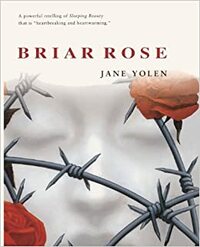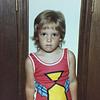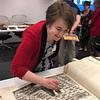Take a photo of a barcode or cover
I thought this book was predictable but I really like the notion of modernizing Fairy Tales and the inherent truth/metaphor of Fairy Tales. It is a simple read, but it does talk a lot about important issues/histories/perspectives especially for a Young Adult audience who may or may not typically pick up a book on the Holocaust, LGBT issues, etc.
I REALLY enjoyed this book. There were a few elements that I could have done without but I liked it so much that I'm not going to knock the rating down. I'm not so sure about it's billing as "young adult". That would depend on how young, I think. There was a small amount of foul language and, after all, it did feature the holocaust.
I read this book as part of a reading challenge for myself this year.
It has been on my shelf for years.
I was surprised by how well the author managed to blend the classic tale of Sleeping Beauty and contemporary topics. Well, contemporary when the book was written (1992).
This book uses Sleeping Beauty as a metaphor for one woman's survival during the Holocaust.
The author does not work to make the atrocities of that time lessened in any way.
The story also gives good insight into the generational gap between those who survived and the ones who came after and this miasma of forgetting that overtook the world after the war ended.
It has been on my shelf for years.
I was surprised by how well the author managed to blend the classic tale of Sleeping Beauty and contemporary topics. Well, contemporary when the book was written (1992).
This book uses Sleeping Beauty as a metaphor for one woman's survival during the Holocaust.
The author does not work to make the atrocities of that time lessened in any way.
The story also gives good insight into the generational gap between those who survived and the ones who came after and this miasma of forgetting that overtook the world after the war ended.
‘Once upon a time …’
I came to this story, as I do so many others, through a friend. She mentioned it and I decided I needed to read it. I knew nothing about the story before I borrowed it from the library, and I had not read any reviews. Which is probably just as well.
Rebecca grew up listening to her grandmother Gemma’s fairy tales. Rebecca’s favourite stories were about ‘Briar Rose’. Years later, when Gemma is dying, she claims that she is Briar Rose. She asks Rebecca:
‘Promise me you will find the castle. Promise me you will find the prince. Promise me you will find the maker of spells.’
Rebecca promises. And despite her family’s misgivings, Rebecca sets out to discover where her grandmother came from and who she really was. Rebecca’s journey takes her from the USA to Poland, back into the horrors of World War II and The Holocaust.
While this book was written for a young adult audience, I think it is relevant to all of us. The story is both heart-breaking and heart-warming: a perfect fairy-tale before such stories were sanitised, before the removal of any ambiguity rendered such stories anodyne.
‘Sometimes living takes more courage than dying.’
Jennifer Cameron-Smith
I came to this story, as I do so many others, through a friend. She mentioned it and I decided I needed to read it. I knew nothing about the story before I borrowed it from the library, and I had not read any reviews. Which is probably just as well.
Rebecca grew up listening to her grandmother Gemma’s fairy tales. Rebecca’s favourite stories were about ‘Briar Rose’. Years later, when Gemma is dying, she claims that she is Briar Rose. She asks Rebecca:
‘Promise me you will find the castle. Promise me you will find the prince. Promise me you will find the maker of spells.’
Rebecca promises. And despite her family’s misgivings, Rebecca sets out to discover where her grandmother came from and who she really was. Rebecca’s journey takes her from the USA to Poland, back into the horrors of World War II and The Holocaust.
While this book was written for a young adult audience, I think it is relevant to all of us. The story is both heart-breaking and heart-warming: a perfect fairy-tale before such stories were sanitised, before the removal of any ambiguity rendered such stories anodyne.
‘Sometimes living takes more courage than dying.’
Jennifer Cameron-Smith
I have so much admiration for Jane Yolen. This story really gripped me, and she did a fabulous job with the subject matter.
This came highly recommended but honestly, I struggled with it. I can't quite put my finger on why I didn't like it, but maybe it's because... there never seemed to be a resolution.
It never came together for me.
It never came together for me.
This book uses the story of Briar Rose as a metaphor and there is no magical element at all.
Jane Yolen has done an amazing job at connecting the classic fairytale ideas of good and evil with real history, and creating this haunting retelling of sleeping beauty. Briar Rose is a reminder of a time period that we all want to forget about.
When i first saw this book on a friend's bookshelf a few years ago, i was compelled to read it, and borrowed it from her.
It sat on my bookshelf for about 2 1/2 years, where i forgot about it, until the other day, when i finally decided to pick it up and read it. And i am so happy i did.
Briar Rose is such a deep and complex novel, and there are a million different concepts to expand on. I wouldn't even know where to start.
Briar Rose reminds us that the Jews were not the only group to be persecuted- and the group that is mostly focused on in this book is homosexuals. I didn't really realise that so many different groups of people were killed- I always just thought it was the jews.
the structure of Briar Rose is unique- In Briar Rose, every odd chapter (in the main part of the book) is a flashback to the main character's (Becca) childhood, where she and her sisters are told the fairytale of Briar Rose. Readers can then connect the actual fairytale to the metaphoric use of it in the novel. I think this was a clever way to help readers understand the connection.
This story made me interested to find out more about the time period and all that happened.
caitlin :)
Jane Yolen has done an amazing job at connecting the classic fairytale ideas of good and evil with real history, and creating this haunting retelling of sleeping beauty. Briar Rose is a reminder of a time period that we all want to forget about.
When i first saw this book on a friend's bookshelf a few years ago, i was compelled to read it, and borrowed it from her.
It sat on my bookshelf for about 2 1/2 years, where i forgot about it, until the other day, when i finally decided to pick it up and read it. And i am so happy i did.
Briar Rose is such a deep and complex novel, and there are a million different concepts to expand on. I wouldn't even know where to start.
Briar Rose reminds us that the Jews were not the only group to be persecuted- and the group that is mostly focused on in this book is homosexuals. I didn't really realise that so many different groups of people were killed- I always just thought it was the jews.
the structure of Briar Rose is unique- In Briar Rose, every odd chapter (in the main part of the book) is a flashback to the main character's (Becca) childhood, where she and her sisters are told the fairytale of Briar Rose. Readers can then connect the actual fairytale to the metaphoric use of it in the novel. I think this was a clever way to help readers understand the connection.
This story made me interested to find out more about the time period and all that happened.
caitlin :)
I figured what it was going to be about. I would've liked it too but I think so much was just repeatation of her telling the story of Sleeping Beauty and ending it in between. I did like the grandma's character but... the story was meh. I just skiped the between and reached the part of the book labeled Castle. still find it meh.. Great topic ofc but the writing and everything, I couldn't gel with it.
I'm very confused about my feelings on this one . . .
On one hand, I didn't expect the inclusion of a gay character and the book to show what happened to gay people during the Holocaust and was so pleasantly surprised. On the other . . . I really hated the MC, Becca and therefore could not get invested in her personal story.
Briar Rose tells the story of Gemma, a woman who uses the story of Sleeping Beauty as a coping mechanism to live with her experiences in the Holocaust. Her role in the story is to tell the story of 'Briar Rose' (Sleeping Beauty) over and over (unfortunately, that is her only role) so that after her death, her granddaughter, Becca, will have the motive to go to Poland and discover what happened to her during the Holocaust.
Becca is the epitome of an entitled American. In Poland, she keeps correcting the English of the girl she meets (. . . in Poland . . . where she is a guest). The girl didn't ask for her to do this beforehand; Becca just did it automatically, as if the rest of the world should know and practice English. She has no interest in learning a bit of Polish either, of course. She may have a job in journalism and editing, but that doesn't mean she has a right to act like the rest of the world should be English-speaking and should cater to her needs.
She's also pretty homophobic herself (can't even walk arm-in-arm with her friend), so the inclusion of the lgbt narrative confuses me.
Anyway, I just can't decide whether I like or dislike this story.
On one hand, I didn't expect the inclusion of a gay character and the book to show what happened to gay people during the Holocaust and was so pleasantly surprised. On the other . . . I really hated the MC, Becca and therefore could not get invested in her personal story.
Briar Rose tells the story of Gemma, a woman who uses the story of Sleeping Beauty as a coping mechanism to live with her experiences in the Holocaust. Her role in the story is to tell the story of 'Briar Rose' (Sleeping Beauty) over and over (unfortunately, that is her only role) so that after her death, her granddaughter, Becca, will have the motive to go to Poland and discover what happened to her during the Holocaust.
Becca is the epitome of an entitled American. In Poland, she keeps correcting the English of the girl she meets (. . . in Poland . . . where she is a guest). The girl didn't ask for her to do this beforehand; Becca just did it automatically, as if the rest of the world should know and practice English. She has no interest in learning a bit of Polish either, of course. She may have a job in journalism and editing, but that doesn't mean she has a right to act like the rest of the world should be English-speaking and should cater to her needs.
She's also pretty homophobic herself (can't even walk arm-in-arm with her friend), so the inclusion of the lgbt narrative confuses me.
Anyway, I just can't decide whether I like or dislike this story.
A very intriguing concept that I was excited to read... but it fell flat. The characters are very one-dimensional and boring. The whole first half of the book is complete "fluff" and the second half dark and serious (but not quite thought-provoking), leaving me confused about the overall feeling the author was going for with this. The parallel with the Sleeping Beauty story is intriguing at first but quickly becomes obvious and later starts to feel really contrived. I kept waiting for a beautiful moment when the whole metaphor would come together and then Becca would discover that her Grandma was an amazing woman with great inner strength or something. Nothing of the sort. In the end she's still just a delusional old lady with no personality who repeats the same old story with annoying frequency.
It was a good idea in concept, but not well written. Not even close.
It was a good idea in concept, but not well written. Not even close.






